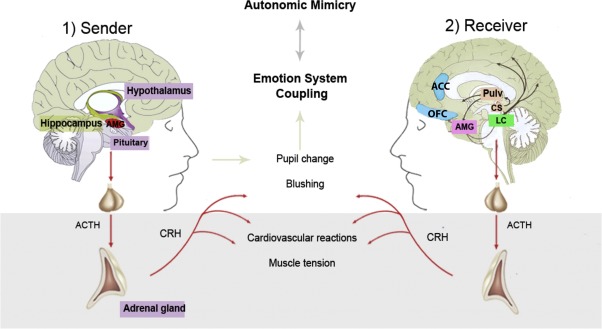Emotion Mirroring: How Our Brains Reflect and React to Others
2024-12-04
Have you ever found yourself smiling when someone else smiles, or feeling uneasy when someone is upset? This phenomenon, known as emotion mirroring, occurs when our brain subconsciously reflects the emotions of others. It plays a significant role in our social interactions and emotional well-being. This article explores how the brain processes emotion mirroring, the variants of emotions involved, and why understanding this phenomenon is essential for maintaining mental health.

How the Brain Behaves During Emotion Mirroring
Emotion mirroring is largely driven by a network of brain cells called mirror neurons. These neurons activate when we observe someone else’s emotional expressions, allowing us to mimic and empathize with their feelings. For instance, when you see someone crying, your brain mirrors their emotional state, triggering a similar response within yourself.
Studies show that the anterior insula and anterior cingulate cortex are key regions involved in emotional empathy. These areas enable us to recognize emotions in others and translate them into our own experiences. According to research published in National Institutes of Health, the activation of these brain regions strengthens social bonds and enhances our ability to connect with others.
Variants of Emotions in Mirroring
Emotion mirroring isn’t always a one-to-one reflection. While we often assume the same emotion is mirrored (e.g., happiness reflecting happiness), the process can produce a range of emotional responses, including:
-
Direct Mirroring: Reflecting the exact emotion observed, such as feeling joyful when someone is excited.
-
Amplified Emotions: Experiencing a heightened version of the observed emotion, such as feeling extreme anger when witnessing mild frustration.
-
Complementary Emotions: Feeling a different but related emotion, such as compassion when observing someone’s sadness.
The type of mirroring depends on the context, individual sensitivity, and past experiences. For example, a person with high emotional sensitivity might experience stronger mirrored emotions compared to someone less empathetic.
Sensitivity and the Importance of Early Signals
One of the most critical aspects of emotion mirroring is identifying which emotions you are most sensitive to. Certain emotions, such as fear or anger, can have a stronger mirroring effect due to their evolutionary significance. For instance, if someone in your group exhibits fear, your brain may mirror this emotion as an instinctive survival mechanism, heightening your own sense of alertness.
Understanding your sensitivity to specific emotions is vital for maintaining emotional well-being. When unchecked, mirrored emotions like fear, anger, or sadness can lead to anxiety, stress, or emotional exhaustion. However, recognizing these signals early allows you to regain control and respond proactively, rather than being overwhelmed by the emotional atmosphere around you.
The Benefits of Tracking Emotion Mirroring
By tracking how and when emotion mirroring occurs, you can gain valuable insights into your emotional patterns and triggers. This practice offers several benefits:
-
Improved Emotional Awareness: Recognizing how others’ emotions influence your own helps you better understand yourself.
-
Enhanced Emotional Regulation: Identifying mirrored emotions early allows you to manage your reactions more effectively.
-
Stronger Relationships: Understanding the mirroring effect can improve empathy and reduce misunderstandings in social interactions.
-
Better Mental Health: Proactively addressing negative mirrored emotions helps prevent emotional burnout and promotes well-being.
Conclusion
Emotion mirroring is a natural process that shapes our interactions and emotional responses. By understanding how the brain reflects emotions and recognizing the variants in this process, you can learn to identify early signals and manage your well-being more effectively. Tracking the mirroring effect is a powerful tool for self-awareness, enabling you to make positive changes and strengthen your emotional resilience. Start paying attention to the emotions you mirror, and take control of your emotional journey today.


